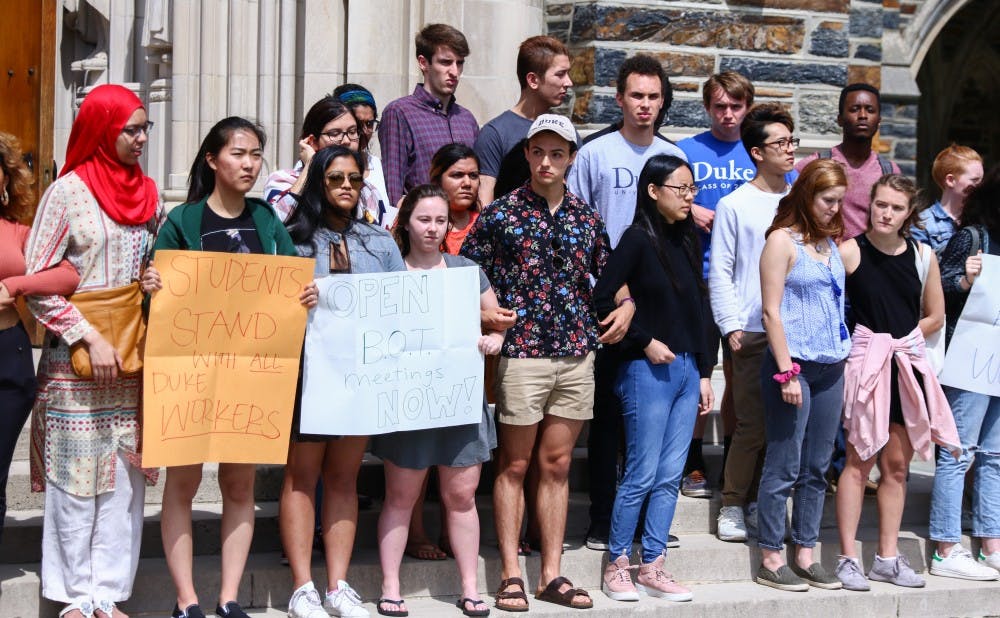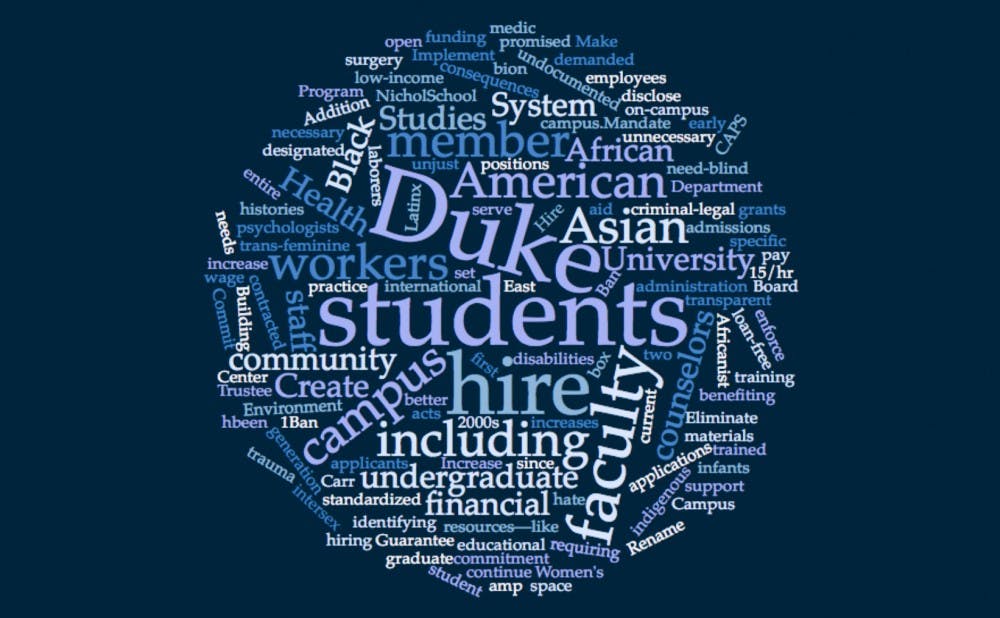
In 1968, after the assassination of Martin Luther King, Jr., protesters had four demands for then-President Douglas Knight—seeing that a "$1.60 minimum wage becomes a top economic priority for the University," establishing a commission to make recommendations on collective bargaining and union recognition, signing a newspaper advertisement supporting racial justice and resigning his membership in the segregated Hope Valley Country Club.
Just over a week ago, undergraduates—affiliated under the "People's State of the University"—rushed the stage at an alumni event when President Vincent Price was speaking. The University considered pursuing student conduct cases but decided not to punish the students, and about 60 faculty signed a letter saying that they didn't support consequences for the students.
"A remarkable similarity exists between the demands of the Vigil Class of 1968, the demands made by black students the next year and the demands made by student protesters every few years since then, including in 2016 and 2018," the letter reads.
In 2016, students who were a part of Duke Students and Workers in Solidarity (DSWS) took over the Allen Building after The Chronicle published articles about Executive Vice President Tallman Trask III hitting a black parking attendant and complaints of racial discrimination in the Parking and Transportation Services department. They issued a list of seven demands.
During the Fall semester before the Allen Building occupation, another group of students released "Demands of Black Voices" after a Black Lives Matter poster was vandalized with a racial slur. Those students issued multiple demands under 10 categories.
The biggest similarity across these four sets of student demands is the focus on wages for workers. From $1.60 in 1968 to $15 in 2018, students throughout Duke history have advocated for better wages for workers. What sets apart the latest set of demands is the emphasis on implementing the $15 per hour wage for a broader group of workers, including undergraduate and graduate workers.
In August 2017, Price announced that the University would be increasing its minimum wage to $15 by 2019 but only for employees and contract workers.
Junior Sydney Roberts, an organizer in the latest protest and in the Allen Building occupation, said demanding better wages is a specific, "material ask" with direct benefits to workers. Although demands to fix systemic issues are important, she said, they also take more time.
"I assume it will be a part of labor at Duke—of wanting something that's material, more immediate than other things, easy to articulate and distribute information on," said Roberts, who is also co-chair of The Chronicle's independent Editorial Board.
The theme of transparency also shows up in the demands of students over the past few years. In 2015, "Black Voices" wanted transparency in the hiring process of professors and the work of the Task Force on Bias and Hate. In 2016, DSWS sought transparency in a review of Duke’s employment standards for sub-contracted workers and the hiring process of administrators.
Specifically this iteration of demands asks for open Board of Trustees meetings, which have been closed for a decade. Roberts said that students who advocate for issues get frustrated in general by the lack of transparency.
What's completely different
There are a few demands that have not previously appeared in any form of recent student demands, such as eliminating "medically unnecessary surgery on intersex infants in Duke Health System" or "banning the box," a hiring practice that requires applicants to disclose their criminal-legal histories when applying for jobs. Roberts said that these demands were included because they were harder to advocate for individually and harder to build coalitions around.
"'It's hard to take up these single issues as a group," she noted. "Like how do you organize around ban the box if the people it affects the most are people who are applying to work at Duke? There just isn't a body that's able to take that on, and that's probably partially why it's just not as actively talked about among students like wages would be."
In the past, demands were issued in reaction to an event on campus or nationally, Roberts added. This time, however, there isn't a specific event that caused the protest.
"People's State of the University was very much organized around a vision of what could happen if we put all our energy and all of our bodies and all of our listservs together into one larger umbrella organization and addressed separate issues that we were all concerned about rather than it being reactive to an example of harm on campus," she said.
Roberts also noted that the demands were really fleshed out because many of the protest organizers have been working on those issues for their entire time at Duke. She highlighted the point about a standardized set of consequences for hate and bias incidents as an example, saying that only people who have knowledge of hate and bias issues understand that there isn't a standardized set of consequences for those incidents across the University.
Get The Chronicle straight to your inbox
Sign up for our weekly newsletter. Cancel at any time.
Class of 2019
Editor-in-chief 2017-18,
Local and national news department head 2016-17
Born in Hyderabad, India, Likhitha Butchireddygari moved to Baltimore at a young age. She is pursuing a Program II major entitled "Digital Democracy and Data" about the future of the American democracy.

